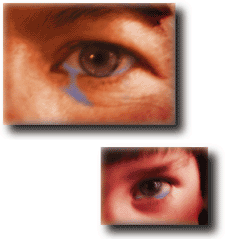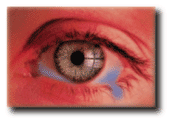 Continued...
Any
investigation of how limitations on speech occasion crying must
include a consideration of the many silences created by death.
Cultures have responded by creating traditions of loud, histrionically
elaborate, and collective funereal or mournful crying.
Continued...
Any
investigation of how limitations on speech occasion crying must
include a consideration of the many silences created by death.
Cultures have responded by creating traditions of loud, histrionically
elaborate, and collective funereal or mournful crying.
 Crying
provokes a conversational voice that death would deny. Members
of a Walt Whitman club were audibly moved to tears as they listened
to a previously undiscovered recording of the poet reading one
of his texts. When Whitman speaks, devotees who have only known
him through his writings and through others' voices suddenly are
being addressed in the poet's own rhythms and tones. The occasion
for discourse is surprising in more than one respect. The prior
communicative asymmetry of the relationship is turned on its head.
Now that the long-imagined speech of the dead immortal can finally
and truly be heard, the spoken response of his living followers
is muffled by tears.
Crying
provokes a conversational voice that death would deny. Members
of a Walt Whitman club were audibly moved to tears as they listened
to a previously undiscovered recording of the poet reading one
of his texts. When Whitman speaks, devotees who have only known
him through his writings and through others' voices suddenly are
being addressed in the poet's own rhythms and tones. The occasion
for discourse is surprising in more than one respect. The prior
communicative asymmetry of the relationship is turned on its head.
Now that the long-imagined speech of the dead immortal can finally
and truly be heard, the spoken response of his living followers
is muffled by tears.
Being
alone is nicely suited to crying, at least among people who presume
that speech requires someone else to talk to. Of course, being
alone, like any of the other factors in this list, is not a sufficient
condition for crying. But in any case the being alone that often
is a basis for crying is loneliness as a phenomenological and
not merely as a physical fact. The key sense is an existential
aloneness, a matter of having no one to speak with about a particular
problem, or no longer having the possibility of speaking with
a particular other about anything.
 Often
crying emerges as a person senses compound barriers to speech.
Writer Brent Staples [AM'76, PhD'82] provided a poignant example
as he recounted his reactions to the death of his younger brother,
Blake, at the age of 22. Shortly before his brother's murder,
Brent had seen Blake laughing about having made fools of the police
while bearing a line of stitches on his hand that he, Blake, attributed
to a recoil from a shotgun. "I lacked the language simply to say:
Thousands have lived this for you and died." They arranged to
meet the following night, but before Brent could try another strategy
to change Blake's life, he got a call informing him that Blake
was dead.
Often
crying emerges as a person senses compound barriers to speech.
Writer Brent Staples [AM'76, PhD'82] provided a poignant example
as he recounted his reactions to the death of his younger brother,
Blake, at the age of 22. Shortly before his brother's murder,
Brent had seen Blake laughing about having made fools of the police
while bearing a line of stitches on his hand that he, Blake, attributed
to a recoil from a shotgun. "I lacked the language simply to say:
Thousands have lived this for you and died." They arranged to
meet the following night, but before Brent could try another strategy
to change Blake's life, he got a call informing him that Blake
was dead.
As
I stood in Chicago holding the receiver...I felt as though part
of my soul had been cut away. I questioned myself then, and
I still do....
For
weeks I awoke crying from a recurrent dream in which I chased
him, urgently trying to get him to read a document I had, as
though reading it would protect him from what had happened in
waking life.
His
eyes shining like black diamonds, he smiled and danced just
beyond my grasp. When I reached for him, I caught only the space
where he had been.
There
is here the silence of language that tries to reach another's
soul but becomes stalled and minimized in conversational maneuverings.
There is the silence sensed in the wish to continue a conversation
with the dead. And there is the silence of a conversation held
in dreams, and in this dream, the additionally silent language
of a document's unread text. Indeed we may suspect that the sleeper's
sense of the mute nature of his dreaming body itself played a
role. Staples, his body too heavy with sleep to speak, dreams
up a frustrated communication that captures his impossible wish
to speak with a correspondent who has become too insubstantial
to respond to language.




![]()
 Continued...
Any
investigation of how limitations on speech occasion crying must
include a consideration of the many silences created by death.
Cultures have responded by creating traditions of loud, histrionically
elaborate, and collective funereal or mournful crying.
Continued...
Any
investigation of how limitations on speech occasion crying must
include a consideration of the many silences created by death.
Cultures have responded by creating traditions of loud, histrionically
elaborate, and collective funereal or mournful crying. Crying
provokes a conversational voice that death would deny. Members
of a Walt Whitman club were audibly moved to tears as they listened
to a previously undiscovered recording of the poet reading one
of his texts. When Whitman speaks, devotees who have only known
him through his writings and through others' voices suddenly are
being addressed in the poet's own rhythms and tones. The occasion
for discourse is surprising in more than one respect. The prior
communicative asymmetry of the relationship is turned on its head.
Now that the long-imagined speech of the dead immortal can finally
and truly be heard, the spoken response of his living followers
is muffled by tears.
Crying
provokes a conversational voice that death would deny. Members
of a Walt Whitman club were audibly moved to tears as they listened
to a previously undiscovered recording of the poet reading one
of his texts. When Whitman speaks, devotees who have only known
him through his writings and through others' voices suddenly are
being addressed in the poet's own rhythms and tones. The occasion
for discourse is surprising in more than one respect. The prior
communicative asymmetry of the relationship is turned on its head.
Now that the long-imagined speech of the dead immortal can finally
and truly be heard, the spoken response of his living followers
is muffled by tears.  Often
crying emerges as a person senses compound barriers to speech.
Writer Brent Staples [AM'76, PhD'82] provided a poignant example
as he recounted his reactions to the death of his younger brother,
Blake, at the age of 22. Shortly before his brother's murder,
Brent had seen Blake laughing about having made fools of the police
while bearing a line of stitches on his hand that he, Blake, attributed
to a recoil from a shotgun. "I lacked the language simply to say:
Thousands have lived this for you and died." They arranged to
meet the following night, but before Brent could try another strategy
to change Blake's life, he got a call informing him that Blake
was dead.
Often
crying emerges as a person senses compound barriers to speech.
Writer Brent Staples [AM'76, PhD'82] provided a poignant example
as he recounted his reactions to the death of his younger brother,
Blake, at the age of 22. Shortly before his brother's murder,
Brent had seen Blake laughing about having made fools of the police
while bearing a line of stitches on his hand that he, Blake, attributed
to a recoil from a shotgun. "I lacked the language simply to say:
Thousands have lived this for you and died." They arranged to
meet the following night, but before Brent could try another strategy
to change Blake's life, he got a call informing him that Blake
was dead.